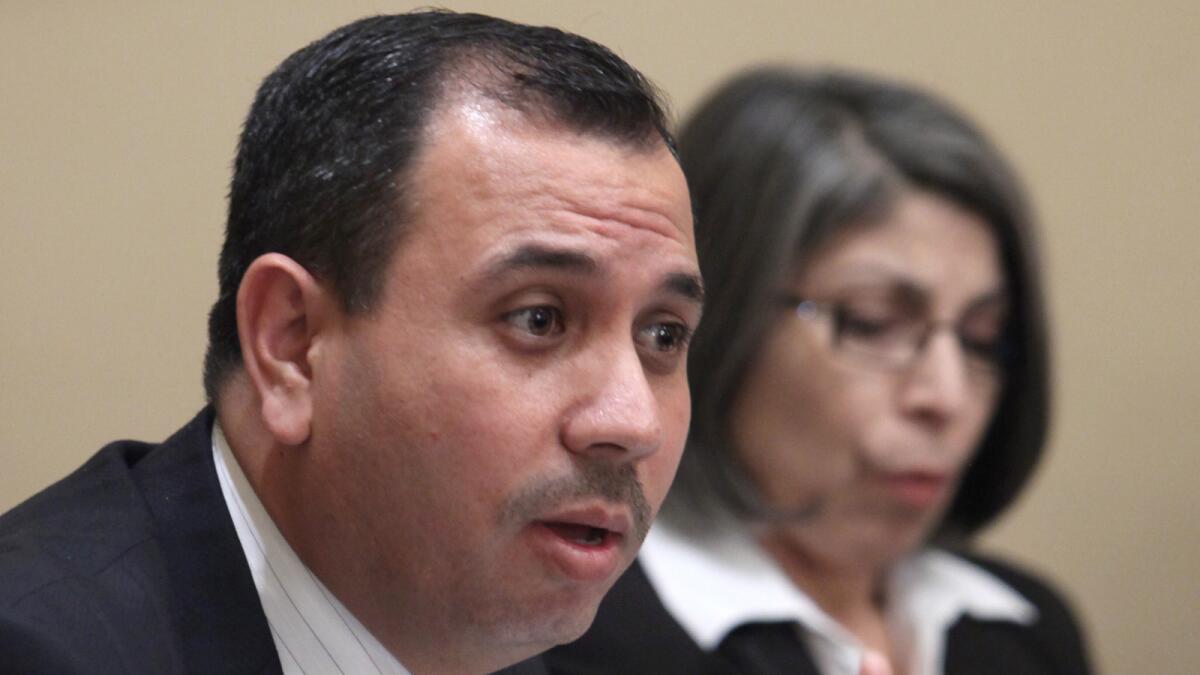Gov. Brown doesn’t want California to use this word for immigrants

State Sen. Tony Mendoza, D-Artesia, had a bill signed by the governor Monday that removes the word “alien” from state labor codes.
- Share via
Reporting from Sacramento — SACRAMENTO — Gov. Jerry Brown signed a trio of immigration-related measures Monday, including one removing the word “alien” from California’s labor code because it is seen as a disparaging term for those not born in the United States.
Brown also signed into law legislation allowing noncitizens in high school to serve as election poll workers and protecting the rights of immigrant minors in civil lawsuits.
“These bills reflect a state that both recognizes and respects the diversity — and contributions — of all Californians,” said Evan Westrup, a spokesman for the governor.
The measures take effect Jan. 1.
The bill banning “alien” is needed to modernize state labor law, in the same way many newspapers have stopped using the term “illegal alien,” said state Sen. Tony Mendoza (D-Artesia), author of the bill.
“Alien is now commonly considered a derogatory term for a foreign-born person and has very negative connotations,” Mendoza said. “The United States is a country of immigrants who not only form an integral part of our culture and society, but are also critical contributors to our economic success.”
The term continues to exist throughout federal immigration law, but there is growing national sentiment that it is inappropriate, said Kevin R. Johnson, dean of Public Interest Law and professor of Chicana/Chicano Studies at UC Davis.
“The concern is that the use of the word ‘alien’ would dehumanize the people affected” and lead to “lack of protections under the law,” Johnson said.
A 2013 Pew Research Center survey of media organizations found that the use of the term “illegal alien” declined to 5% of the terms used that year, down from 21% usage six years earlier.
Mendoza’s measure amends a law enacted in 1937 that said “aliens” should be hired on public-works contracts only after citizens of the United States. Part of that law was repealed in 1970, but the term “alien” remains in the labor code.
Also on Monday, Brown approved legislation allowing high school students who are legal permanent residents to serve as poll workers in California elections, in part to help with translation needs in an increasingly diverse voting population.
Currently, students 16 and older may serve as poll workers, but they must be U.S. citizens. Adult poll workers only have to be lawful permanent residents.
With the new law, “not only are we expanding our access to bilingual poll workers, we are providing high-school-aged lawful permanent residents firsthand experience with American democracy,” Assemblyman Kevin Mullin (D-South San Francisco) said, “hopefully inspiring them to become naturalized voting citizens in the future.”
Brown also signed a bill barring the consideration of a child’s immigration status in civil actions involving liability.
That measure, by Assemblyman Jimmy Gomez (D-Echo Park), is in response to a lawsuit on behalf of more than 80 elementary school children against the Los Angeles Unified School District over alleged sexual misconduct by a former teacher at Miramonte Elementary School.
Attorneys for the plaintiffs asked the court to preclude inquiry into the immigration status of the plaintiffs in the case. The school district argued against the request, saying immigration status is relevant to determining the plaintiffs’ potential for earning money in the future.
Existing law specifies situations in which immigration status is not to be considered, but it does not address minor children or personal injury matters, state officials said. The bill signed by the governor clarifies that the immigration status of a minor child, under any applicable law, is irrelevant to the issues of liability or remedy.
“An undocumented child deserves the same protections as any other child in our state,” Gomez said. He added that his bill will “ensure fairness for all minors and the prevention of devaluing any child, when they are the victims of crime, regardless of their immigration status.”
In all, the governor signed 15 bills Monday. Another, by Sen. Holly Mitchell (D-Los Angeles), allows children 13 and younger who are witnesses in violent crimes to testify by remote video
Twitter: @mcgreevy99
MORE ON IMMIGRATION:
Detained immigrant mothers and children trapped in legal limbo
2 immigrants in U.S. illegally are named to Huntington Park commissions
Immigrants’ visas expire but many remain, despite repercussions
More to Read
Sign up for Essential California
The most important California stories and recommendations in your inbox every morning.
You may occasionally receive promotional content from the Los Angeles Times.











